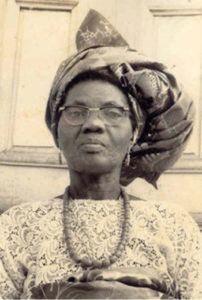
Funmilayo Ransome-Kuti
*Funmilayo Ransome-Kuti was born on this date in 1900. Frances Abigail Olufunmilayo Thomas, also known as Funmilayo Anikulapo-Kuti, was a Nigerian educator, political campaigner, suffragist, and women's rights activist.
Frances Abigail Olufunmilayo Olufela Folorunso Thomas was born in Abeokuta, Ogun State, Nigeria, to Chief Daniel Olumeyuwa Thomas, a member of the aristocratic Jibolu-Taiwo family, and Lucretia Phyllis Omoyeni Adeosolu. Her father farmed and traded palm produce, and her mother worked as a dressmaker. Her parents married in 1897 and had two children who died in infancy before Frances was born.
Although it was uncommon for Nigerian families to invest in education for girls, Frances' parents believed in the importance of education for both boys and girls. She attended Abeokuta Grammar School for her secondary education. From 1919 to 1922, she went abroad and participated in a finishing school for girls in Cheshire, England, where she learned elocution, music, dressmaking, French, and various domestic skills. There, she decided to use her shortened Yoruba name, Funmilayo, instead of her Christian name Frances. As a young adult, she was a teacher, organizing some of the first preschool classes in the country and arranging literacy classes for lower-income women.
In 1925, Funmilayo married Reverend Israel Oludotun Ransome-Kuti, a member of the Ransome-Kuti family. Israel found work as a school principal and firmly believed in bringing people together and overcoming ethnic and regional divisions. He later co-founded the Nigeria Union of Teachers and the Nigerian Union of Students. In 1928, she established one of the first preschool classes in Nigeria. Around the same time, she started a club for young women of elite families to encourage their "self-improvement" while organizing classes for illiterate women. Between 1935 and 1936, the couple arranged to purchase a secondhand car and had it shipped to them from England. Ransome-Kuti was the first woman in Abeokuta to drive a car. Their marriage would last 30 years – until Israel's death – and was marked by a sense of equality and deep mutual respect between the couple. Ransome-Kuti and her husband had four children: a daughter named Dolupo (1926) and sons Olikoye "Koye," Olufela "Fela," and Bekolari "Beko."

During the 1940s, Ransome-Kuti established the Abeokuta Women's Union and advocated for women's rights, demanding better representation in local governing bodies and ending unfair taxes on market women. Described by media as the "Lioness of Lisa," she led marches and protests of up to 10,000 women, forcing the ruling Alake to surrender in 1949 temporarily. As Ransome-Kuti's political influence grew, she participated in the Nigerian independence movement, attended conferences, and joined overseas delegations to discuss proposed national constitutions. Spearheading the creation of the Nigerian Women's Union and the Federation of Nigerian Women's Societies, she advocated for Nigerian women's right to vote. She became a noted member of the international peace and women's rights movements. She received the Lenin Peace Prize and membership in the Order of the Niger for her work. In her later years, she supported her sons' criticism of Nigeria's military governments.
In the last years of Anikulapo-Kuti's life, her son Fela, a musician and activist, became known for his vocal criticisms of Nigerian military governments. Fela had been arrested and briefly imprisoned during the early 1970s, and authorities had raided his home and properties several times. To show his disdain for the Federation of Nigeria's leader, he named his home property "the Kalakuta Republic." He transformed it into a commune where friends and supporters could gather and spend time without fear of the military authorities. In November 1974, Nigerian police raided his nightclub in town with axes and tear gas, leaving Fela with injuries. In 1976, Fela released an album called Zombie, in which he compared the army to mindless machines, and many believe that this album acted as a final straw in the conflict between Fela and the government.
Anikulapo-Kuti often visited her son at his compound, and she was there on February 18, 1977, when close to 1,000 armed soldiers surrounded and stormed the property. When the soldiers broke inside, they destroyed property and assaulted the residents. Anikulapo-Kuti was thrown from a second-floor window. She was hospitalized and lapsed into a coma. She died on April 13, 1978, from her injuries. Anikulapo-Kuti's remains were interred in Abeokuta in the same vault as her husband. Major Nigerian news outlets published eulogies, naming the activist "a progressive revolutionary" and "a Pan-African visionary."
On the first anniversary of Anikulapo-Kuti's death, her son Fela took a coffin. He traveled nearly 20 kilometers to Dodan Barracks in Lagos (then Nigeria's Supreme Military Headquarters), leaving the coffin at the gate to shame the government. His song "Coffin for Head of State" details the invasion, her death, and the casket's movement.